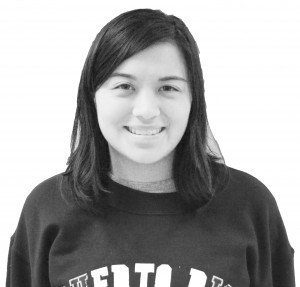Far too often, I have seen students try to find the easiest classes to enroll in or spend more time figuring out the minimum effort required to pass a class than they do on the actual class work.

However, as students, we shouldn’t go through the motions of our classes.
We shouldn’t be satisfied with classes that only earn us a requirement. We should want to take classes that make us think. We should immerse ourselves in them, and get the most out of them as we can.
A common joke is that the “N” in NMU stands for knowledge. While it’s kind of catchy, think about how degrading this is to ourselves and where we have chosen to get an education. We shouldn’t want Northern to have a reputation like this, and we shouldn’t encourage it with lazy attitudes and actions.
This semester, I’m taking American Indians: Identity and Media, a class offered through the Native American Studies (NAS) program on campus. I was a little nervous with signing up for a 300-level class. My only thoughts were that it sounded like an interesting subject but that it was an upper-level course and therefore a harder class to earn a good grade in, and that it would be my first NAS class, so I may not understand everything discussed.
But I’ve discovered it’s not all about grades and understanding in some classes. There’s so much more you can get out of a class when you stop worrying about your GPA. NAS 320 has been my favorite class so far.
Why? Because it makes me think. It confuses and frustrates me, but I love it. I have yet to feel despair, although that may be coming.
“Learning most things is a messy process. Confusion, frustration, even despair regularly occur. If students never experience those feelings, they also never experience the thrill of finally figuring something out, of really understanding and of being changed by what they learned.”
These words, spoken by Maryellen Weimer, a professor emeritus of speech communication at Penn State, were included in the syllabus for NAS 320.
Along with discussing our syllabus, during the first week of class, we discussed and dissected our learning objectives. One of them included the term “politics of representation.” In fact, one of the main focuses of this class is Native representation in movies and TV.
Although we talk about the representation of Native peoples in the media and how stereotypical it is, this wouldn’t be possible without some background information, especially since I wasn’t the only person in the class with a lack of knowledge regarding Native history.
When I was younger, I watched “Peter Pan” without giving it a second thought. I watched Western movies and wanted to dress up as a Native American. Now that I know those images were so false and disrespectful, I feel a little bit silly.
I knew the real Christopher Columbus story—not the one we learned in kindergarten—and I knew of the crimes committed against Native tribes by the United States government, but I was unaware of the extent. Learning only a small portion of the Native perspective in regards to U.S. history confused me.
The first week of class, it was hard for me to hear about Native history because of the way our government treated — and continues to treat — Native Americans. It was hard for me to accept that our government was even worse than it is now. After a month of class, it’s easier for me to stomach. I’ve been changed by what I’ve learned.
Students should not shy away from enrolling in classes that may make them think critically or have a chance of being too difficult or lowering their GPA.
These classes should be embraced as a chance to learn. We can make the “NMU: where the ‘N’ stands for knowledge” joke, but for students who want to be challenged, the opportunity to do so is very possible on NMU’s campus.





















